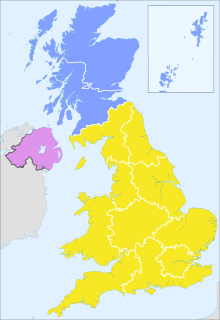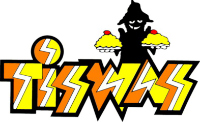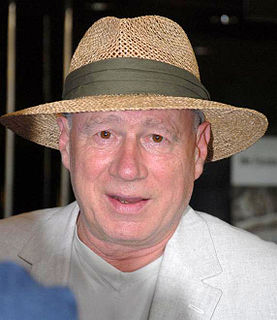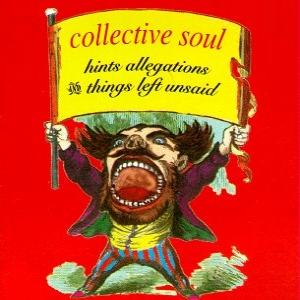The Four Bucketeers were an ad-hoc music/water-throwing group from the ITV children's programme Tiswas .

ITV is a British free-to-air television network with its headquarters in London. It was launched in 1955 as Independent Television, under the auspices of the Independent Television Authority (ITA), to provide competition to BBC Television which had been established in 1932. ITV is the oldest commercial network in the UK. Since the passing of the Broadcasting Act 1990, its legal name has been Channel 3, to distinguish it from the other analogue channels at the time, namely BBC 1, BBC 2 and Channel 4. In part, the number 3 was assigned because television sets would usually be tuned so that the regional ITV station would be on the third button, with the other stations being allocated to the number within their name.

Tiswas is a children's British television series that originally aired on Saturday mornings from 5 January 1974 to 3 April 1982 and was produced for the ITV network by ATV Network Limited.
Officially, the Four were Chris Tarrant, Sally James, John Gorman and Bob Carolgees; sometimes Lenny Henry contributed as well. Gorman was the musical talent in the group, having been part of The Scaffold and the Grimms. The musicians backing them up included Ollie Halsall (guitar), John Halsey (drums) and Clive Griffiths (bass).

Christopher John Tarrant, is an English radio and television broadcaster. He presented the ITV children's television show Tiswas from 1974 to 1981, and the game show Who Wants to Be a Millionaire? from 1998 to 2014. He was a Capital Radio host from 1984 to 2004.
Sally James is a former presenter on the ITV Saturday morning children's show Tiswas from 1977 until it ended in 1982. James’ role on the show included conducting the "Almost Legendary Pop Interviews," interviewing many famous musical acts including Elvis Costello, Sting, The Clash, Motörhead, and The Pretenders
Bob Carolgees is a comedy entertainer who appeared on the Saturday morning TV series Tiswas and then later in its adult versions O.T.T. and Saturday Stayback. He is best known for appearing with a canine puppet named Spit the Dog.
The Four Bucketeers' best-known number (and also their highest-charting single) was "Bucket Of Water Song", which reached No. 26 in the UK Singles Chart in 1980. [1]
A record chart, also called a music chart, is a ranking of recorded music according to certain criteria during a given period of time. Many different criteria are used in worldwide charts, often in combination. These include record sales, the amount of radio airplay, the number of downloads, and the amount of streaming activity.

In the music industry, a single is a type of release, typically a song recording of fewer tracks than an LP record or an album. This can be released for sale to the public in a variety of different formats. In most cases, a single is a song that is released separately from an album, although it usually also appears on an album. Typically, these are the songs from albums that are released separately for promotional uses such as digital download or commercial radio airplay and are expected to be the most popular. In other cases a recording released as a single may not appear on an album.

The UK Singles Chart is compiled by the Official Charts Company (OCC), on behalf of the British record industry, listing the top-selling singles in the United Kingdom, based upon physical sales, paid-for downloads and streaming. The Official Chart, broadcast on BBC Radio 1 and MTV, is the UK music industry's recognised official measure of singles and albums popularity because it is the most comprehensive research panel of its kind, today surveying over 15,000 retailers and digital services daily, capturing 99.9% of all singles consumed in Britain across the week, and over 98% of albums. To be eligible for the chart, a single is currently defined by the Official Charts Company (OCC) as either a 'single bundle' having no more than four tracks and not lasting longer than 25 minutes or one digital audio track not longer than 15 minutes with a minimum sale price of 40 pence. The rules have changed many times as technology has developed, the most notable being the inclusion of digital downloads in 2005 and streaming in July 2014.
Originally the song was composed and performed as a sketch within the Tiswas programme. According to Sally James, "John came in one day and he said ‘I’ve sort of got this idea’. It’s a march basically, and we all sing this song. And it’s another excuse to chuck buckets of water! So obviously we didn’t do it in the studio. We had this little area outside the back of the studio where a camera would sort of poke out of the window, so we ended the show down there marching about, sploshing all this water from the buckets. And then the next week it was incredible, because the people were jamming the switchboard, ‘I’ve got to have this record!’. There was never any idea that it would be a record, but of course we did quickly make a record and it became a hit. It just all happened so left-of-field and so unplanned…but then that’s how a lot of things did happen in Tiswas. Things that you think would work, don’t, and things that you ‘Oh that’ll be good for a one-off’ end up being huge hits". [2]
The moniker 'The Four Bucketeers' came about as a way of circumnavigating any potential copyright difficulties of using the 'Tiswas' brand when Tarrant and Co. performed the song outside of the TV show situation, and the initial record release. Ultimately though, a compromise was reached and thereafter, the phrase 'Tiswas presents The Four Bucketeers' was used.
Copyright is the exclusive right, given to the creator of a creative work, to reproduce the work, usually for a limited time. The creative work may be in a literary, artistic or musical form. Copyright is intended to protect the original expression of an idea in the form of a creative work, but not the idea itself. A copyright is subject to limitations based on public interest considerations, such as the fair use doctrine in the United States. Some jurisdictions require "fixing" copyrighted works in a tangible form. It is often shared among multiple authors, each of whom holds a set of rights to use or license the work, and who are commonly referred to as rights holders. These rights frequently include reproduction, control over derivative works, distribution, public performance, and moral rights such as attribution.
The aquatic theme was carried through into a less successful follow-up single, the anthemic waltz-time "Water Is Wonderful", which eulogised:
- 'Water is wonderful, water's superb
- 'Water's too powerful to conquer or curb
- 'Water's at its best when you can chuck it
- 'Over yourself from out of a bucket.'
An album, entitled Tiswas Presents The Four Bucketeers, was also released. This included both singles (albeit a different version of "Water Is Wonderful") together with other skits from the television series. Contrary to the impression given by the singles, these were not all concerned with pailborne aquatic antics. All of The Four Bucketeers' records were produced by Neil Innes.

An album is a collection of audio recordings issued as a collection on compact disc (CD), vinyl, audio tape, or another medium. Albums of recorded music were developed in the early 20th century as individual 78-rpm records collected in a bound book resembling a photograph album; this format evolved after 1948 into single vinyl LP records played at 33 1⁄3 rpm. Vinyl LPs are still issued, though album sales in the 21st-century have mostly focused on CD and MP3 formats. The audio cassette was a format widely used alongside vinyl from the 1970s into the first decade of the 2000s.

A record producer or music producer oversees and manages the sound recording and production of a band or performer's music, which may range from recording one song to recording a lengthy concept album. A producer has many, varying roles during the recording process. They may gather musical ideas for the project, collaborate with the artists to select cover tunes or original songs by the artist/group, work with artists and help them to improve their songs, lyrics or arrangements.

Neil James Innes is an English writer, comedian and musician. He collaborated with Monty Python and played in the Bonzo Dog Doo-Dah Band and The Rutles.
A third single was released from the album featuring Matthew Butler (the 6 year old who dressed as a rabbit) singing "Bright Eyes".










